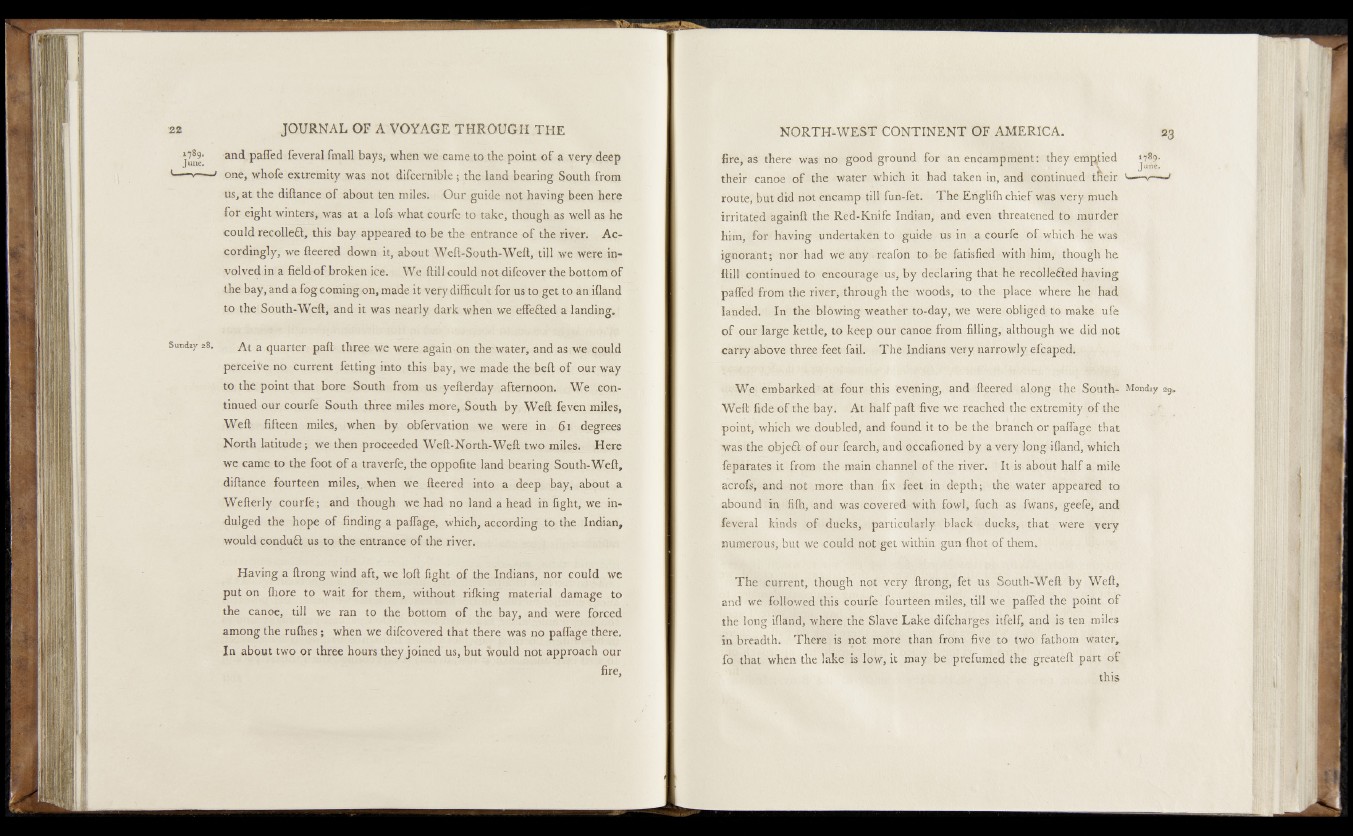
■ andypaffed feyeral final! bays, when we came to the point of a very deep
one, whofe extremity was. not difcernibk; the land bearing South from
us, at the diftance o f about ten miles; Our guide not having .been here
■ for eight winters^ was at a lois what courfe to take, though as well as he
could reeolfeQ, this bay appeared <to be the entrance of the. river. Accordingly;
we fleered down it, about WefhSou th-Weft, til 1 we were in-
•volved in a field<of broken ice. We ftill could notdifcover the bottomLof
the bay, and a fog coming on, made it very difficult for us to get to anifland
to the * South-Weft, and it was nearly dark when we effected a landing.
Sunday fi8. - At a quarter: paft. three.we were again on the'water, and as.we-gould
perceive no current fetting into, this bay, we made the-heft ©fi; qurysay
to the point that bore South from us yefterday .afternoon. ' Continued
our courfe South three miles more, South by, Weft.fgyen/nfiles,
Weft-^fifteen miles, when by obfervation we, wejne in Si degrees
North latitude; we then proceeded Weft-North-Weft twp miles. Here
we came to the foot of a traverfe, the oppolite land bearing. South-Weft,
diftance fourteen miles,-when we, fleered into a^deepjbayi^ouf a
Wefteriy courfe; and though we had no land a head in fight, we indulged
the hope of finding a paffage, which, according to the Indian,
would conduH us to the entrance of the river* fM
Having a ftrong wind aft, we loft fight of the Indians, nor could we
put on ftiore to wait for them, without rifking material damage to
the canoe, till we ran to the bottom of the bay, and' were forced
among the ruflies; when we discovered that there was no paffage there.
In about two or three hours they joined us, but would not approach our
fire,
fire, aS" there- -was- n o r go'od. ground for van encampment: they emmied J 7 * |-
their cano%,ofrthe Water-'<vhidh>it had taken in, and;Continued tneir \——'
rotftefbut did not encanfip tijkfun-ftt;; . The Eriglilh chief Was very much
irritated«againft the Red-Knife Indian,- and* ev-en.(threatenedo murder
him, forhaving undertaken to guide us in a eourfev/pf,which he was
ignorant f'nor had wq-any |leafdh 1,0« be fatisfi%d sjwfth him, though he
ft ilk'continued tOf'cncourage^us, by declaring that he recollfefied having
palled-from the river^through the-fwoods, to „-the place -where he had
landed; Jg In the blowing weather tp-day, we were^qbliged! to. make ufe
of our large kettle, to keep our canoe from filling,; although we did not
carry above three feet fail.- ?t|Fhe-Indians vefy narrow.lyefpaped.
W e embarked at four this evening, and fleered, along the Souths Mondays
Weft- fidetdftHhe bay; A t half paft five we reached the- extremity ibf the
point--which we doubled, and found--it to be the branch cm,petflage that
wasithe object- of Our- fear oh, and!-©ecafioned,bya.yerylong-ifland, which
fep&rates it from the main-channel of the river. < It is about half a mile
acrofs, and not more than:ffix feet, in t depth!$$the water appeared to
abound tin ^h, and Was covered» with fowl, fach as fwans, -geefej and
feveral kinds o f ducks, particularly- black ducks, • that were ,-ivery
numerous, but we-could,not get within, gun (hot of them.
The -current, though not very ftrong, fet us South-Weft by Weft,
and we followed this courfe fourteen miles, till we pafled the point of
the long ifland, where the Slave Lake difcharggs-, itfelfiand is ten miles
in breadth. There is not more than from five to two fathom water,,
fo that when the lake is low, it may be pre'fumed the greateft part o f
this.